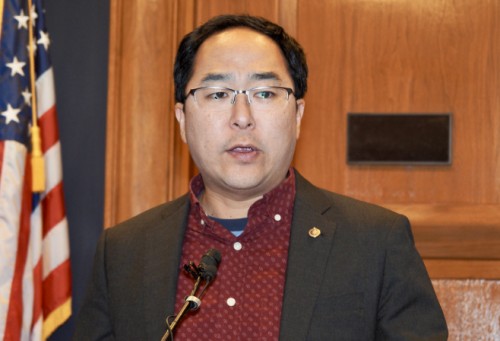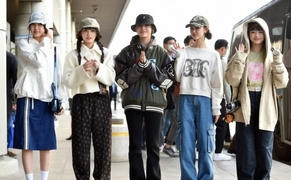 |
| Korean American Sen. Andy Kim (D-N.J.) speaks at a press briefing with Korean correspondents at the U.S. Capitol in Washington on August 28. / Source: Ha Man-joo |
Korean American Sen. Andy Kim (D-N.J.) voiced support Thursday for President Lee Jae-myung’s stance that South Korea can no longer pursue the so-called anmi-gyeongjung path—relying on the U.S. for security while maintaining deep economic ties with China.
Speaking with Korean correspondents at the U.S. Capitol, Kim said Lee’s remarks at a Center for Strategic and International Studies (CSIS) lecture in Washington earlier this week reflected “a global environment that is constantly undergoing significant change.”
He pointed to North Korea’s growing dependence on Russian support, China’s increasingly coercive economic tactics against South Korea, Japan and other Indo-Pacific nations, and shifting regional dynamics. “It is important for Korea to lean in and on the United States, and to view America as a strategic ally,” Kim said.
The senator stressed that these geopolitical shifts necessitate greater “strategic flexibility” for U.S. Forces Korea, to be paired with America’s extended nuclear deterrence, or “nuclear umbrella.”
Kim argued that the North Korea–Russia military partnership, the use of drones in Ukraine, and the spread of new weapons technology across the Indo-Pacific all demand a nimble security posture. “We need to think about the big picture,” he said. “The United States’ deterrent power will help defend the Korean Peninsula, and my conviction that Washington must provide extended deterrence to Seoul remains unchanged.”
Currently, Washington and Seoul are discussing giving U.S. forces stationed in Korea broader missions beyond deterring the North, including countering China and responding to potential conflicts in the Taiwan Strait.
President Lee, however, struck a cautious tone in a recent interview aboard his flight to Washington, acknowledging U.S. calls for flexibility but warning it would be “difficult for us to agree easily” to expanded roles for U.S. troops.
Kim reaffirmed his opposition to any troop cuts or redeployments of U.S. forces in Korea to other parts of the Indo-Pacific without prior consultation between the U.S. and South Korean governments and the U.S. Congress.
Most Read
-
1
-
2
-
3
-
4
-
5
-
6
-
7





















